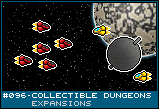|
Mechanic #096 - Collectible Dungeons - Expansions |
 | Posted: 12/01/08
Legend of Zelda done with procedural generation and collectible cards, part 6. Themed expansions and space ships. |
Welcome to part six of this increasingly not four part series. This time I want to talk about how this approach can be converted to other genres and how to expand it for max effect.
When you think about collectible card games, one of the first things you think about is their propensity for expansion sets. Same thing here. New sets could potentially be released that simply add new monsters, dungeon types, puzzles, tools, loot, and whatever. The more cards that are available, the more options you have when building worlds.
A better release approach would be to package these extras in specific gameplay themes. Think of it this way. Rather than releasing a set which has a few of these, a few of those, and a few extra of that, have it very tightly themed towards one particular type of experience.
For instance, you could have an Orc theme which includes a set of Orc-type monsters (Orcs, goblins, wolves, etc), Orc themed equipment (jagged swords, metal armor, potion of Orc strength), an Orc tool (bows with flame arrows) and associated puzzles, and an Orc-themed dungeon or two (Orc cave, Orc infested ruins, etc). Heck, we'll even throw in an Orcish avatar and Orc-styled towns so the player could play as an Orc. Then package it up with a few challenges which showcase the cards in a very Orc-centric game and boom, the Orc theme.
Now, the player can buy the Orc theme and introduce all of it at once, or just the parts he wants. Maybe the Jagged Sword is pretty nifty but the player doesn't care for Orcs. Just take the loot you like. Create a game where you play as an Orc from a small Orc village attacking human outposts, or play as a human who encounters Orcs out there in the wild. Throw in some additional themes for Dwarves and Elves and you could create a Lord of the Rings themed game, or heck, nobody likes Elves anyway, so just ignore the their theme altogether (except for the mithril loot, of course).
Beyond those kinds of things, you could just release themed packs of a smaller, more focused nature. For instance, a collection of tools and puzzles that could be inserted into any game. A bunch of avatars and loot. Or just a bunch of villagers and towns. I, personally, think that themes will generate more interest and be better for players to design and build games of their choosing. I mean, it's great to get a set with a little bit of everything, but then it would be up to the player to put together his own themes, and it could be frustrating to want to make an Orc cave with only three Orc cards per expansion.
Now I'm going to discuss taking this deck building concept into genres other than Zelda-likes. The Zelda-like is essentially an adventure game. You have a puzzle tree and must accomplish things in a specific order. But compare that to something like a space trading game, where the player builds a ship, explores planets, joins alliances, builds droids, trades goods for money, and fights space pirates.
To go into that genre, you need to change the focus a bit - it's actually easier. Rather than building a big connected overworld with a bunch of different biomes and controlled passage through it, each world is typically a single biome to begin with. And since the purpose is exploration rather than puzzle solving, you can treat planets as glorified dungeons (with dungeons in them). Enter the Planetary Deck.
Each planet has its own deck which defines how the planet is designed. The planet can be something simple, like an 8x8 grid with dungeons placed in it and craft nodes, monsters, and exploration aspects. Each dungeon has a deck as well, so that a planet is both the Planetary Deck and a bunch of Dungeon Decks.
With space, just set it up into a bunch of sectors. The Planetary Deck, which defines how the planet's land is built, would also tell the space sector what the planet looked line and what space features it contained. Other heavenly bodies would be simpler, taking up just a single deck. For instance, you could have space stations that you can land on that have just a single deck that decides not only the floorplan and what's inside it, but also whether or not it launches pirates in space when the player gets near.
To sum up, the game is made from multiple space sectors. Each sector has a collection of decks that define what are inside it. Planets contain additional decks that define the locations of interest on the planet surface (not just dungeons, but alien ruins, colonies, pirate infested factories, enemy outposts, etc). Following the themed expansion pack approach, you can do a pack for alien races, packs which introduce a backstory for those alien ruins, new planets, and so on.
You can, of course, use this approach for a fantasy game, replacing spaceships with boats and worlds with continents. Or mix the two and have continents which feature multiple biomes and a structured progress through the game, but split up into a bunch of independent islands (Wind Waker?).
There's no reason why we could mix these two concepts together. Though different in many ways, certain things operate in the same fashion. For instance, monsters and dungeon themes. Maybe you could travel between planets and locate space Elves and space Orcs (worked for Warhammer 40k). Perhaps run around your high fantasy world with a shotgun and space suit. Yeah, these thematic elements don't always go together, but who is to tell the player what they can and can't do? |